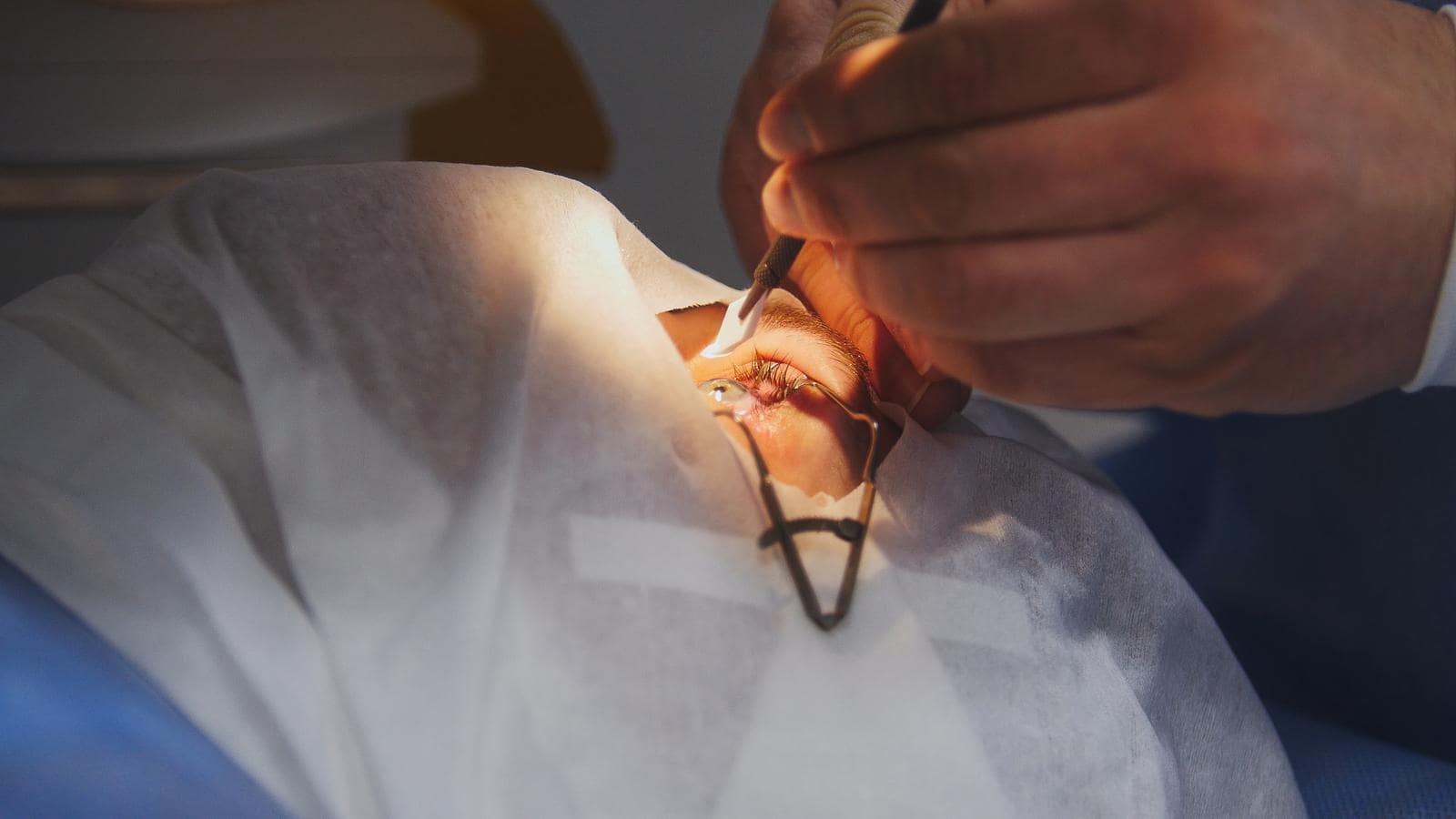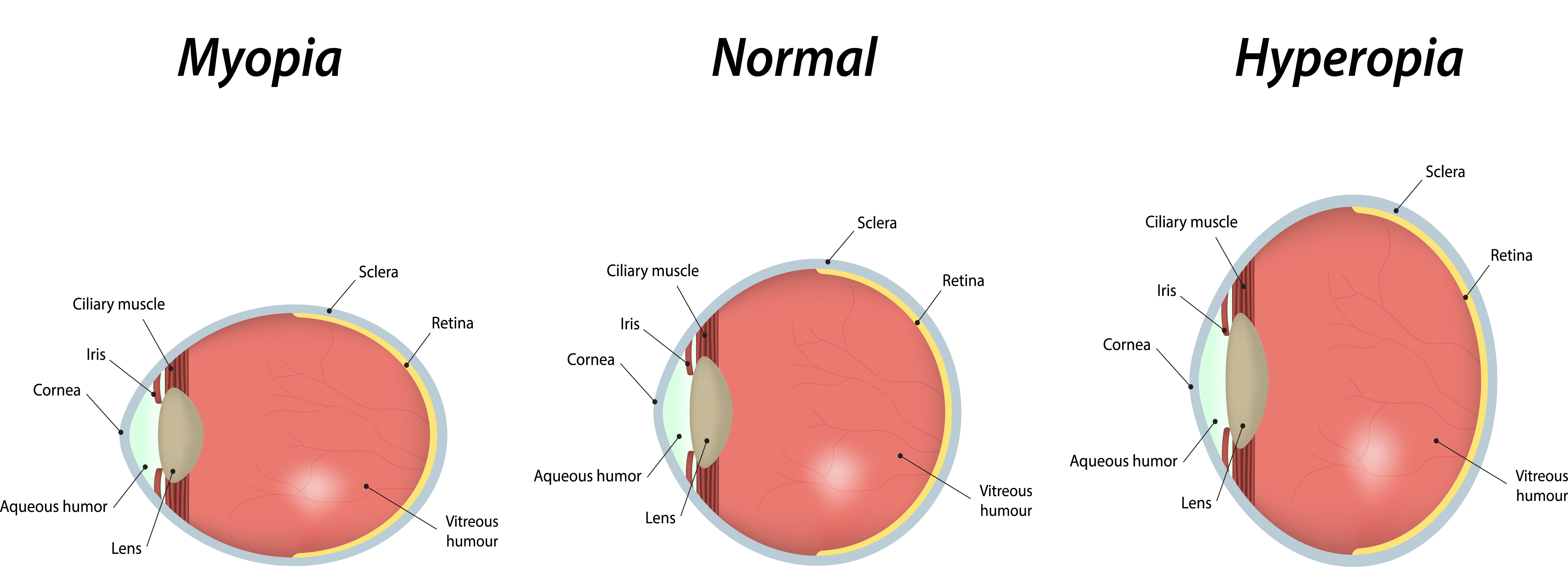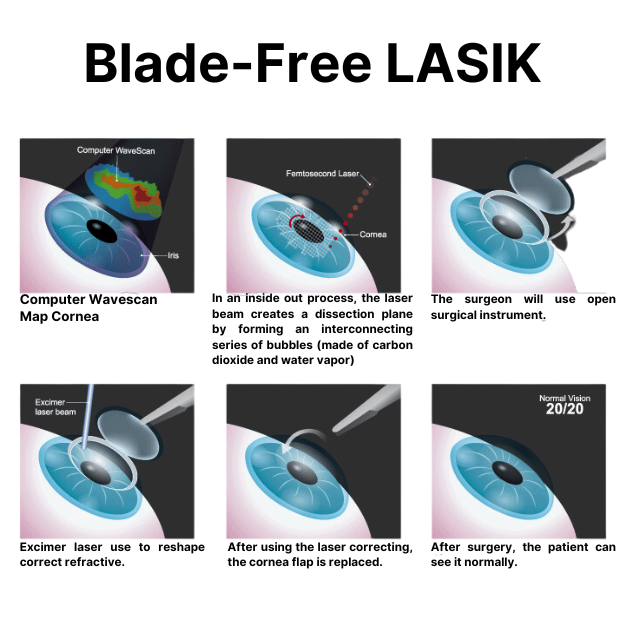Updated on October 10, 2024
What Factors Affect How Long LASIK Lasts?

Vision Center is funded by our readers. We may earn commissions if you purchase something via one of our links.
LASIK eye surgery is a vision correction procedure that treats vision conditions such as:
- Myopia (nearsightedness)
- Hyperopia (farsightedness)
- Astigmatism

One of the most common questions people have regarding LASIK is how long does LASIK last?
How Long Does Lasik Last?
Your corneal tissues don’t grow back, so the effects of LASIK last for the rest of your life. It’s a permanent procedure, but it’s still possible for your visual acuity to decrease due to other natural reasons.
The laser reshapes your cornea during the procedure by removing some corneal tissue. LASIK laser vision correction is typically a safe surgical procedure. More than 95 percent of those who receive LASIK surgery are satisfied with the outcome.1
Factors Affecting Vision Changes After LASIK
There are several factors to consider before deciding on LASIK surgery. These factors can affect how long you retain clear vision post-LASIK:
1. Refractive Error
A refractive error occurs when your eye's focusing power from the cornea and lens is inaccurate. The cornea is responsible for two-thirds of your eye's focusing ability, and the lens accounts for about a third.
In myopic refractive error, your eye's focusing power is too strong. In hyperopia, the vision is under-focused. LASIK surgery alters the cornea's focusing power to correct these refractive errors.
However, over time, the focusing power of your lens can still change. This could lead to post-LASIK vision deterioration, known as regression.

Regression after LASIK Operation
After LASIK surgery, changes in the lens' focusing power may cause vision to worsen. This phenomenon is called regression.
Even with regression, it's unlikely for vision to return to its pre-LASIK state. Studies indicate that only 1 to 2 percent of people require an enhancement procedure in the first year post-LASIK due to significant regression.2
After ten years, this need increases to about 10 percent.2 Additionally, those with higher refractive errors before LASIK, especially with substantial nearsighted corrections, are more likely to experience regression.
2. Age
When considering LASIK surgery, age plays a crucial role for a few reasons:
- Vision stabilization. Typically, vision stabilizes in your mid-20s. Undergoing LASIK before this can increase the risk of vision regression.
- Presbyopia onset. Starting around age 40, many experience presbyopia or difficulty seeing up close. This progresses until age 60, and LASIK doesn’t prevent this age-related change.
How Does Aging Affect Post-LASIK Vision?
While LASIK corrects vision in people approaching their 40s, you’ll need reading glasses once presbyopia begins. Although this isn’t a form of regression, presbyopia causes continual changes in the vision after LASIK.
Another side effect of LASIK is dryness. The frequency of dry eye also increases with age, particularly in menopausal or post-menopausal women.
Dry eye complications can affect the overall quality of vision. Hence, it may emphasize symptoms of blurred vision related to regression.
3. Cataracts
Cataracts are a typical age-related change, affecting almost everyone over 60. While LASIK has no age limit, older people must consider potential vision changes due to cataracts.
Cataracts develop in the eye's lens and not the cornea. Therefore, undergoing LASIK doesn’t affect the development or treatment of cataracts. However, if you develop cataracts after receiving LASIK and your vision worsens, you may need cataract surgery.

How Does Cataract Surgery Benefit Post-LASIK Patients?
One benefit of cataract surgery is that it can correct your vision by placing an artificial lens implant into your eye. Such an implant improves your sight, so you may not need glasses after surgery.
Some people with mild cataracts choose not to have LASIK, knowing they may need cataract surgery soon. This way, only one operation is necessary, as opposed to two.
14 Tips for Protecting Your Vision After LASIK
Improper care can lead to complications in healing the flap, vision issues, or infections. Proper eye care during healing is essential to reduce risks and complications.
Here are 14 tips to help protect your vision after LASIK eye surgery:
- Only drive once you can see enough.
- Reduce screen time for the first week or avoid screens entirely for the first day.
- Don’t rub your eyes for the first month.
- Wait a day to shower and wash your hair, and keep the water, shampoo, and soap out of your eyes when you do.
- Use a protective eye shield for as long as recommended.
- Avoid spas, whirlpools, hot tubs, swimming pools, and saunas for a few weeks.
- Avoid strenuous activity, including exercise, for the first two to three days.
- If you do, wait a few weeks before playing sports, and wear goggles for the first few months.
- Wear sunglasses when in direct sunlight for the first month.
- Stay away from particularly dusty or dirty environments for at least a week.
- Avoid using eye makeup, lotions, and creams near the eyes for two weeks, and be careful when using products like shaving cream or hair spray.
- Use eye drops to prevent dry eyes.
- Stick to your surgical care team's eye care plan, and take all your medications.
- Attend follow-up appointments to discuss any questions or concerns with your eye doctor.
The Risks of LASIK Enhancements
When considering LASIK enhancement surgery, your doctor will evaluate various factors and risks:
- Candidate suitability. The decision to undergo enhancement surgery depends on several factors, including eye health and personal considerations.
- Complications risks. Epithelial ingrowth and corneal ectasia are potential complications of LASIK enhancement. The rate of epithelial ingrowth is considerably low in initial LASIK surgery.
- Epithelial ingrowth. This involves additional cells accumulating under the corneal flap, causing visual disturbances that need further surgery.
- Corneal thickness. Each procedure harvests more corneal tissue, making the cornea thinner. Insufficient tissue thickness can render LASIK unsafe.
- Aging and vision changes. Your eyes naturally adjust as you age, potentially altering the prescription and correction due to primary LASIK surgery. This change in vision clarity might necessitate considering LASIK enhancement to rectify these changes.
Rare LASIK Complications
As with any surgery, there are risks. A small percentage of people experience adverse side effects or complications.
Rare visual disturbances and side effects of LASIK surgery include:
- Halos
- Glares
- Starbursts
- Poor night vision
- Vision problems discerning contrast
- Dry eyes
- Vision loss
Many people who experience minor refractive errors following LASIK laser eye surgery aren’t bothered by the change and don’t seek additional vision correction.
Can You Get LASIK Again?
Yes, you can get LASIK surgery again. Generally, there’s no limit on how many LASIK surgical procedures you can undergo in your lifetime, but this depends on the thickness of your cornea.
- LASIK enhancement surgery. LASIK enhancement surgery is a second procedure available for those who experience major vision changes after their first LASIK. Doctors can perform it months or years later to improve vision that has deteriorated since the initial surgery.
- Prescription eyeglasses. For those experiencing minor vision changes post-LASIK, prescription glasses can be an alternative. Glasses are especially helpful for specific activities like night driving, where precision vision is crucial.
However, only some are eligible for an enhancement. If your corneas are too thin, performing another LASIK procedure may be risky.
Alternatives to Getting LASIK Again
Consult with your surgeon or doctor to determine if additional LASIK procedures are safe for you. They will assess the thickness of your cornea.
Laser surgery procedures such as PRK can help if your cornea is too thin. Many surgeons choose it as an alternative to LASIK enhancement to minimize the risk of epithelial ingrowth.
Here are other alternatives to consider:
Photorefractive Keratectomy
The surgeon may perform a PRK (photorefractive keratectomy) instead of LASIK for the enhancement procedure. PRK is another refractive surgery that doesn’t require lifting the corneal flap, which reduces your risk for certain complications.
Monovision LASIK
If your near vision worsens due to presbyopia, your surgeon can perform monovision LASIK. If your distance vision is still good, the surgeon may only need to correct one eye for reading, usually your non-dominant eye.
After the surgery, you will use one eye to see far and another to read up close. Some people have trouble adapting to monovision. Ask your doctor to test this method with contact lenses before committing to LASIK.
Does One Type Of LASIK Last Longer Than Others?
There are two ways the surgeon can create a corneal flap during LASIK. One method uses a femtosecond laser or bladeless LASIK.

The traditional method uses the surgical blade microkeratome. Both ways are safe and effective, delivering excellent visual results.
Some studies have concluded that in the first year after surgery, bladeless LASIK carries a lower risk for regression versus bladed LASIK.3 Learn more about blade vs bladeless LASIK here.
What are the Side Effects of LASIK?
Directly after LASIK laser eye surgery, you may experience the following symptoms for a few days up to a few weeks:
- Redness
- Soreness
- A burning sensation
- Cloudy vision
- The feeling that there’s a foreign object in your eyes
- Visual disturbances
Excessive dry eyes can occur for as long as six months following LASIK. Nonetheless, your eyesight should stabilize within six months following LASIK.
Following the eye care plan as directed by your doctor and surgical team will boost your healing and visual success rate. If any side effects worsen or don’t resolve, speak with your eye doctor.
LASIK FAQs
Is LASIK surgery a permanent fix?
Yes, LASIK is a permanent laser vision correction procedure that reshapes your cornea. The corneal tissue doesn’t grow back. However, other vision problems can still develop due to age or trauma.
How often does LASIK need to be redone?
In many cases, you don’t have to redo LASIK. However, your vision may change for natural reasons such as age or trauma. You can correct this with eyeglasses, corrective lenses, or other surgical procedures like LASIK enhancement and PRK when this occurs.
Can laser eye surgery wear off?
LASIK doesn’t wear off since it is a permanent treatment option. The symptoms of vision loss you experience are due to other natural reasons, such as a refractive error, age-related vision changes, or trauma.
In this article
13 sources cited
Updated on October 10, 2024
Updated on October 10, 2024
About Our Contributors
Dr. Melody Huang is an optometrist and freelance health writer with a passion for educating people about eye health. With her unique blend of clinical expertise and writing skills, Dr. Huang seeks to guide individuals towards healthier and happier lives. Her interests extend to Eastern medicine and integrative healthcare approaches. Outside of work, she enjoys exploring new skincare products, experimenting with food recipes, and spending time with her adopted cats.
